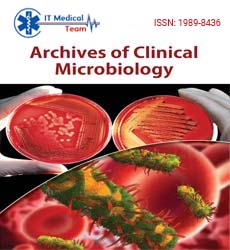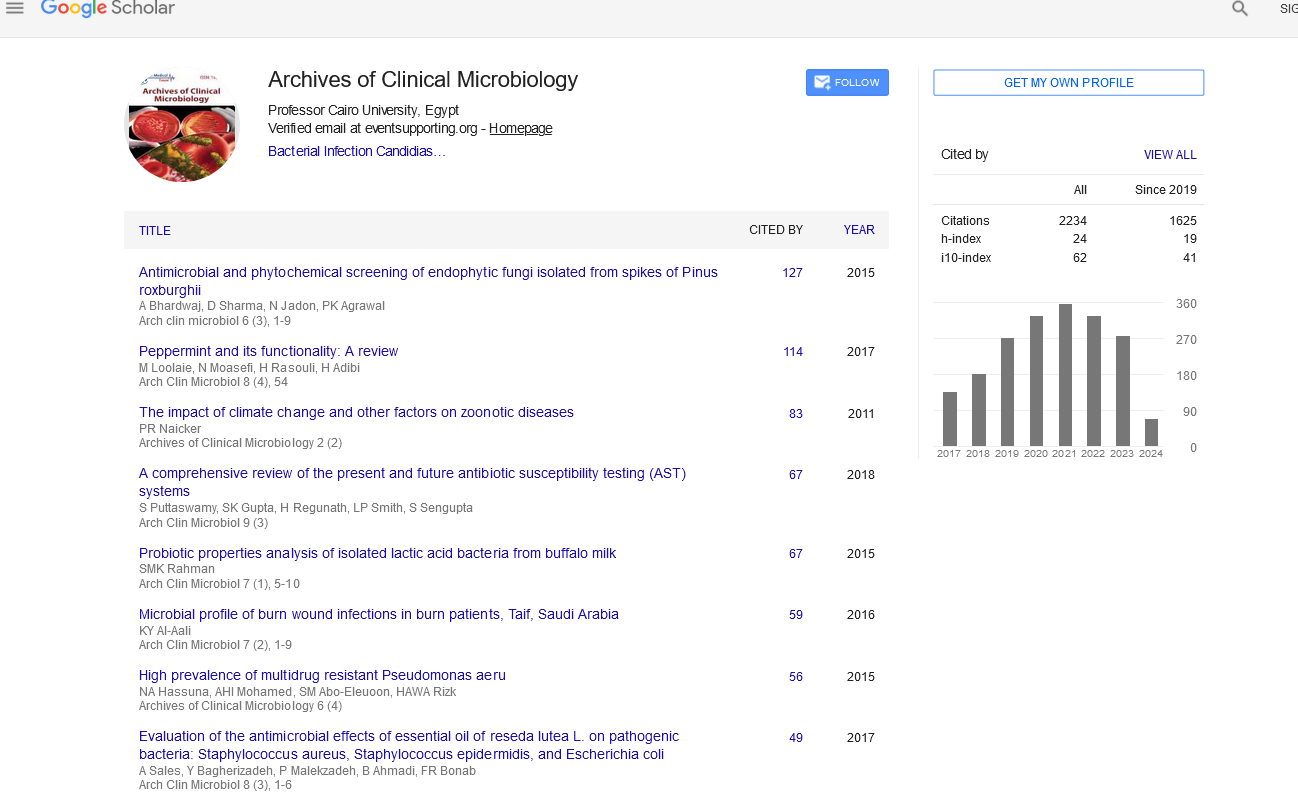Perspective - (2024) Volume 15, Issue 1
Unraveling the Intricacies of Urine Cultures: A Comprehensive Exploration
Avi Peretz*
Department of Microbiology, Hebrew University of Jerusalem, Jerusalem, Israel
*Correspondence:
Avi Peretz, Department of Microbiology, Hebrew University of Jerusalem, Jerusalem,
Israel,
Email:
Received: 03-Jan-2024, Manuscript No. IPACM-24-14439;
Editor assigned: 05-Jan-2024, Pre QC No. IPACM-24-14439 (PQ);
Reviewed: 19-Jan-2024, QC No. IPACM-24-14439;
Revised: 29-Jan-2024, Manuscript No. IPACM-24-14439 (R);
Published:
05-Feb-2024
Introduction
Urine cultures play a pivotal role in the diagnosis and
management of Urinary Tract Infections (UTIs), providing
valuable insights into the microbial landscape of the urinary
system. This diagnostic tool has evolved over the years,
becoming an indispensable component of healthcare practices
worldwide. In this article, we will delve into the intricacies of
urine cultures, exploring their significance, methodology,
interpretation, and the role they play in patient care.
Description
The significance of urine cultures
Urine cultures are instrumental in identifying and characterizing
the causative agents of urinary tract infections. UTIs, affecting
millions annually, can lead to complications if not promptly and
accurately diagnosed. A urine culture helps healthcare
professionals pinpoint the specific bacteria responsible for the
infection, guiding the selection of appropriate antibiotics for
targeted treatment.
Methodology
The process of conducting a urine culture involves several
steps. First, a clean-catch or catheterized urine sample is
collected to avoid contamination. The sample is then streaked
onto a culture plate, allowing bacteria to proliferate. These
colonies are subsequently identified and tested for susceptibility
to various antibiotics. Automated systems and advanced
technologies have streamlined this process, enhancing efficiency
and accuracy.
Common microorganisms
Numerous microorganisms can cause UTIs, with Escherichia
coli being the most prevalent culprit. Other bacteria such as Klebsiella, Proteus, and Enterococcus may also be identified.
Understanding the spectrum of potential pathogens aids
healthcare providers in tailoring treatment strategies to
individual patients.
Interpreting urine culture results
Interpreting urine culture results requires a nuanced
understanding of microbiology. The presence of a significant
number of Colony Forming Units (CFUs) indicates bacterial
growth, while the type of bacteria and their susceptibility to
antibiotics guide treatment decisions. Clinicians must consider
the patient's symptoms, medical history and risk factors when
interpreting results, ensuring a personalized and effective
approach.
Challenges and controversies
Despite their diagnostic utility, urine cultures are not without
challenges. Contamination during sample collection, false
positives and the emergence of antibiotic resistant strains pose
ongoing concerns. Additionally, the interpretation of culture
results may vary, leading to controversies in treatment decisions.
Researchers and healthcare professionals continually strive to
address these challenges through ongoing advancements in
technology and methodology.
Urine cultures in special populations
Certain populations, such as pregnant women and individuals
with compromised immune systems, require special attention
when it comes to urine cultures. The implications of UTIs in
these groups extend beyond immediate health concerns,
impacting fetal development and overall systemic health.
Tailoring urine culture practices to suit the unique needs of
these populations is crucial for optimal patient outcomes.
Future directions
As technology advances, the field of urine cultures continues to
evolve. Molecular diagnostic techniques, including Polymerase
Chain Reaction (PCR) and next generation sequencing, show
promise in enhancing the speed and accuracy of identifying
pathogens. These innovations may revolutionize the landscape of
urine culture diagnostics, offering more precise and rapid results.
Urine cultures remain an indispensable tool in the diagnosis
and management of UTIs, providing critical information for
targeted antibiotic therapy. Despite challenges and ongoing
controversies, advancements in technology and methodology
continue to refine and improve this diagnostic approach. The future holds exciting possibilities for the evolution of urine
cultures, with the potential to revolutionize our approach to
urinary tract infections and enhance patient care.
Conclusion
Urine cultures play a crucial role in the diagnosis and
treatment of urinary tract infections, offering a personalized
approach to healthcare. By identifying the specific
microorganisms causing infections and their susceptibility to
antibiotics, healthcare professionals can tailor treatment plans,
minimize complications, and contribute to the global effort in
combating antibiotic resistance.
As technology continues to advance, improvements in
diagnostic techniques and the development of more rapid and
accurate tests are anticipated. However, for now, urine cultures
remain a cornerstone in the diagnostic arsenal, providing
valuable information that aids in the management of urinary
tract infections and the overall promotion of urinary health.
Citation: Peretz A (2024) Unraveling the Intricacies of Urine Cultures: A Comprehensive Exploration. Arch Clinic Microbio Vol:15 No:1:242





